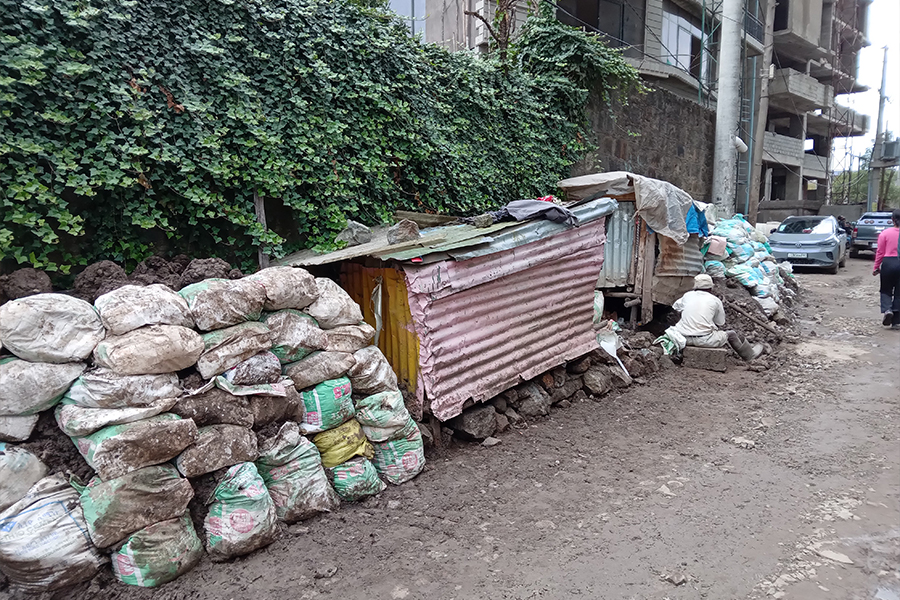
Life Matters | Aug 10,2024
Sep 3 , 2022
By Eden Sahle
Three years ago, I travelled to Bale Goba with non-nationals to support a hospital in that area. We were meeting a medical doctor who works over there. When we arrived, the doctor was nervously speaking to armed police officers. It took him hours to finish with them. When he came to meet us, he was still shaking.
To make our conversation private from my friends, I asked him in Amharic if he was alright and why the police were interrogating him. Wiping the pouring sweat from his face, he replied that a fellow medical doctor was arrested after a charge was instituted against him for committing a medical error that ended a patient’s life.
I asked him if his friend had committed the error. He affirmed but continued with a shocking statement.
“The patient will not come back to life because he is serving a jail term. It only destroys the doctor's life and career,” he said in anger.
He was willing to lie to the authorities that the doctor did not commit a medical error punishable by the law. Afterwards, I could not hear anything he was saying. He tapped my shoulder, assurred me that this is common and that mistakes happen in any profession. From that day on, I have interviewed medical professionals, patients, and families about such matters.
I have discovered hard-to-believe cases that medical professionals do to conceal errors and silence victims' families from pressing charges. I observed that medical professionals often refuse autopsy requests from families, convincing them it is irrelevant except for harming the deceased. When families insist, they refuse to give bodies, preparing the body for burial instead of an autopsy.
When victim families press charges, they are handed over patient history that is fabricated after the person's death. They are introduced to a new fatal disease that they were not told about before the patient was alive and admitted to the hospital. The new digital card system supports such crimes to thrive as its easily changeable by those who have access to it.
Take, for example, a thirty-year-old man who allegedly came for a minor sinus and died because he was injected with the wrong medication by the nurse on the night shift. The doctor involved kept silent as it would implicate her as well. His puzzled family carried out the body of a man that had walked into the hospital by himself a couple of hours before.
Take another tragic story of an intern medical doctor who admitted a young woman in labour. She came to the emergency room in the middle of the night. He could not get support from the resident doctor who allegedly refused to wake up. He did the procedure by himself even though he was not yet qualified to do as such. He ended up with a dead mother because he did not know how to stop the bleeding.
He handed over the baby to a grieving father. The husband has no clue what went wrong behind closed doors. To the intern doctor’s surprise, the resident doctor who found out the woman had passed away in the morning wrote a justifiable cause of death report on her medical card without even being bothered to ask what happened to her. The intern played along because he did not want to ruin his career, which depended on the resident doctor.
Maternity wards at public hospitals are blighted by midwives committing grave mistakes and ending the life of a mother and that of her infant. A ward is a complex place where midwives are looked down upon by medical doctors and want to prove something at the expense of patients and their infants. When the error happens, they cover each other’s back because the doctors also seek to avoid responsibility.
I have encountered cases where medical directors in public hospitals sack doctors for committing fatal errors. But even if the case is serious enough to cause revocation of the doctor’s medical license and required criminal charges, those in charge are reluctant to do as such. When they encounter families who want to take the case to court, they dismiss their claim. They justify their actions by saying they do not have time to appear in court as witnesses.
Most errors occur during shifts where medical doctors fail to properly hand over cases to the next person on duty. They reluctantly leave patient cases when their exhausting shift is over. They do not check if the patient is given the proper medication.
Errors and cover-ups are rampant. The local system does not allow families to be near patients in treatment or with mothers in the delivery room. Vulnerable patients and babies are at the mercy of medical professionals. Behind closed doors of hospitals, so much happens, including crimes that remain buried in the minds of practitioners.
Just like in any profession, there is the good and the bad, but it seems there are many practising medical professionals who are not living up to their promise of caring for patients to the best of their abilities. They started to see patients and their families as enemies who could land them in jail for their mistakes. Instead, they should develop compassion and respect the trust their patients place in them.
PUBLISHED ON
Sep 03,2022 [ VOL
23 , NO
1166]

Life Matters | Aug 10,2024

Commentaries | Sep 03,2022

My Opinion | May 25,2024

News Analysis | Dec 15,2024

Radar | Aug 13,2022

Radar | Nov 21,2018

View From Arada | Nov 02,2024


In-Picture | Jul 28,2024

Fortune News | Nov 24,2024

My Opinion | 131981 Views | Aug 14,2021

My Opinion | 128369 Views | Aug 21,2021

My Opinion | 126307 Views | Sep 10,2021

My Opinion | 123925 Views | Aug 07,2021

Dec 22 , 2024 . By TIZITA SHEWAFERAW
Charged with transforming colossal state-owned enterprises into modern and competitiv...

Aug 18 , 2024 . By AKSAH ITALO
Although predictable Yonas Zerihun's job in the ride-hailing service is not immune to...

Jul 28 , 2024 . By TIZITA SHEWAFERAW
Unhabitual, perhaps too many, Samuel Gebreyohannes, 38, used to occasionally enjoy a couple of beers at breakfast. However, he recently swit...

Jul 13 , 2024 . By AKSAH ITALO
Investors who rely on tractors, trucks, and field vehicles for commuting, transporting commodities, and f...

Jul 5 , 2025
Six years ago, Ethiopia was the darling of international liberal commentators. A year...

Jun 28 , 2025
Meseret Damtie, the assertive auditor general, has never been shy about naming names...

Jun 21 , 2025
A well-worn adage says, “Budget is not destiny, but it is direction.” Examining t...

Jun 14 , 2025
Yet again, the Horn of Africa is bracing for trouble. A region already frayed by wars...

Jul 6 , 2025 . By BEZAWIT HULUAGER
The federal legislature gave Prime Minister Abiy Ahmed (PhD) what he wanted: a 1.9 tr...

Jul 6 , 2025 . By YITBAREK GETACHEW
In a city rising skyward at breakneck speed, a reckoning has arrived. Authorities in...

Jul 6 , 2025 . By NAHOM AYELE
A landmark directive from the Ministry of Finance signals a paradigm shift in the cou...

Jul 6 , 2025 . By NAHOM AYELE
Awash Bank has announced plans to establish a dedicated investment banking subsidiary...